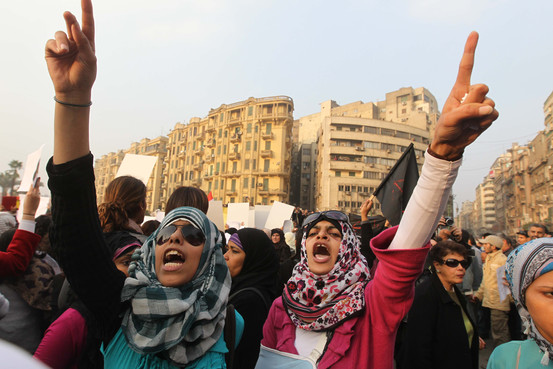
In the wake of the recent military crackdown on protesters in front of the cabinet building and Tahrir Square, captured by the iconic image of a woman dragged down the street, stripped, and beaten by soldiers of the Supreme Council of the Armed Forces (SCAF), Egyptian women have gathered today for a Women’s March to condemn the systematic use of violence against all women and to reiterate the revolution’s calls for the SCAF to relinquish power to a civilian body. Despite the attack on protesters in the early hours of Tuesday morning that resulted in the deaths of four protesters, hundreds of Egyptian women from diverse walks of life rallied in Tahrir square to demand dignity and respect for their role in the revolution and as equal citizens in the post-Mubarak era.
The Women’s March began in Tahrir, marching through downtown Cairo to Talaat Harb circle, looping around to pass by the Press Syndicate building, to Mahmoud Bassiouni street, before returning to Tahrir square. By 4:00 p.m., the protest had swelled in number to nearly ten thousand with men of all ages joining the march in solidarity and to form a human shield to protect participants. Although the march was sparked by outrage over gender-based violence against female protesters, activists like Maha El Samadouni said they were rallying to demonstrate the strength of Egyptian women and reject their portrayal as victims. Among the chants calling for freedom and an end to military rule, protesters also shouted, “they say they protect us when they are the ones who strip us," and “the women of Egypt are a red line.”
Although SCAF General Adel Emara promised to investigate the case of a woman stripped and beaten in Tahrir, many protesters feel that any investigation conducted by the ruling authority lacks credibility. One female activist who preferred to remain anonymous said, “The soldiers who humiliated and stomped on the woman while clearing Tahrir represent only a small part of the problem. The SCAF has clearly given orders to their forces to scare women and make sure they do not join protests by any means necessary. The tactics of shaming women into submission may have worked before, but now we not afraid to speak up and fight for our rights.” The SCAF released a formal apology to the women of Egypt in “Communiqué 91” for the recent incidents surrounding the Occupy Cabinet protests. But the furious backlash from activists on Twitter, however, clearly indicates that this apology is too little too late.
Tarek Radwan is an Egyptian human rights activist specializing in international law and conflict resolution. He has worked for Human Rights Watch’s MENA division and the United Nations mission (UNAMID) in Darfur as a Human Rights Officer. He currently provides consulting services on civilian protection and Middle East issues.
Photo Credit: Wall Street Journal
Image: OB-RC083_122011_G_20111220133138.jpg
